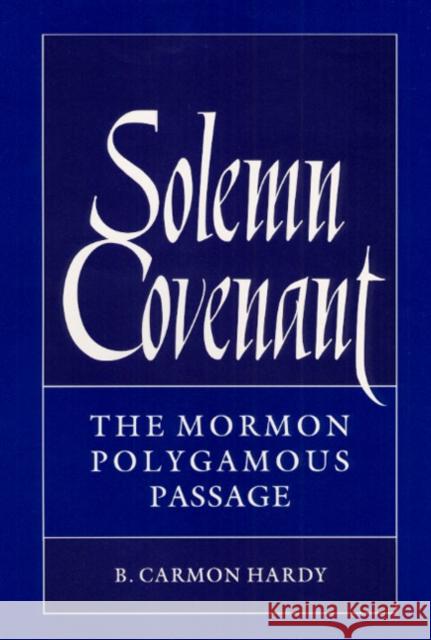Solemn Covenant: The Mormon Polygamous Passage » książka
Solemn Covenant: The Mormon Polygamous Passage
ISBN-13: 9780252018336 / Angielski / Twarda / 1992 / 488 str.
In his famous Manifesto of 1890, Mormon church president Wilford Woodruff called for an end to the more than fifty-year practice of polygamy. Fifteen years later, two men were dramatically expelled from the Quorum of Twelve Apostles for having taken post-Manifesto plural wives and encouraged the step by others. Evidence reveals, however, that hundreds of Mormons (including several apostles) were given approval to enter such relationships after they supposedly were banned. Why would Mormon leaders endanger agreements allowing Utah to become a state and risk their church's reputation by engaging in such activities--all the while denying the fact to the world? This book seeks to find the answer through a review of the Mormon polygamous experience from its beginnings. In the course of national debate over polygamy, Americans generally were unbending in their allegiance to monogamy. Solemn Covenant provides the most careful examination ever undertaken of Mormon theological, social, and biological defenses of the principle. Although polygamy was never a way of life for the majority of Latter-day Saints in the nineteenth century, Carmon Hardy contends that plural marriage enjoyed a more important place in the Saints' restorationist vision than most historians have allowed. Many Mormons considered polygamy a prescription for health, an antidote for immorality, and a key to better government. Despite intense pressure from the nation to end the experiment, because of their belief in its importance and gifts, polygamy endured as an approved arrangement among church members well into the twentieth century. Hardy demonstrates how Woodruff's Manifesto of 1890 evolved from a tactic to preservepolygamy into a revelation now used to prohibit it. Solemn Covenant examines the halting passage followed by the Church of Jesus Christ of Latter-day Saints as it transformed itself into one of America's most vigilant champions of the monogamous way.











